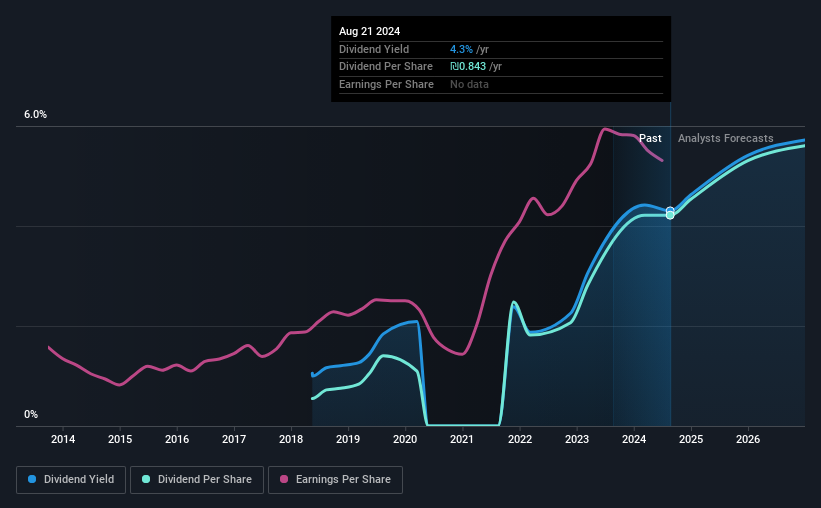Is It Smart To Buy Israel Discount Bank Limited (TLV:DSCT) Before It Goes Ex-Dividend?

Some investors rely on dividends for growing their wealth, and if you're one of those dividend sleuths, you might be intrigued to know that Israel Discount Bank Limited (TLV:DSCT) is about to go ex-dividend in just three days. The ex-dividend date is one business day before a company's record date, which is the date on which the company determines which shareholders are entitled to receive a dividend. The ex-dividend date is important because any transaction on a stock needs to have been settled before the record date in order to be eligible for a dividend. In other words, investors can purchase Israel Discount Bank's shares before the 26th of August in order to be eligible for the dividend, which will be paid on the 8th of September.
The company's next dividend payment will be ₪0.2534334 per share, and in the last 12 months, the company paid a total of ₪0.84 per share. Last year's total dividend payments show that Israel Discount Bank has a trailing yield of 4.3% on the current share price of ₪19.60. Dividends are a major contributor to investment returns for long term holders, but only if the dividend continues to be paid. So we need to check whether the dividend payments are covered, and if earnings are growing.
View our latest analysis for Israel Discount Bank
Dividends are typically paid from company earnings. If a company pays more in dividends than it earned in profit, then the dividend could be unsustainable. Israel Discount Bank is paying out just 24% of its profit after tax, which is comfortably low and leaves plenty of breathing room in the case of adverse events.
Generally speaking, the lower a company's payout ratios, the more resilient its dividend usually is.
Click here to see the company's payout ratio, plus analyst estimates of its future dividends.

Have Earnings And Dividends Been Growing?
Stocks in companies that generate sustainable earnings growth often make the best dividend prospects, as it is easier to lift the dividend when earnings are rising. Investors love dividends, so if earnings fall and the dividend is reduced, expect a stock to be sold off heavily at the same time. Fortunately for readers, Israel Discount Bank's earnings per share have been growing at 19% a year for the past five years.
The main way most investors will assess a company's dividend prospects is by checking the historical rate of dividend growth. Israel Discount Bank has delivered 40% dividend growth per year on average over the past six years. It's great to see earnings per share growing rapidly over several years, and dividends per share growing right along with it.
To Sum It Up
From a dividend perspective, should investors buy or avoid Israel Discount Bank? When companies are growing rapidly and retaining a majority of the profits within the business, it's usually a sign that reinvesting earnings creates more value than paying dividends to shareholders. Perhaps even more importantly - this can sometimes signal management is focused on the long term future of the business. We think this is a pretty attractive combination, and would be interested in investigating Israel Discount Bank more closely.
With that in mind, a critical part of thorough stock research is being aware of any risks that stock currently faces. Case in point: We've spotted 1 warning sign for Israel Discount Bank you should be aware of.
If you're in the market for strong dividend payers, we recommend checking our selection of top dividend stocks.
New: AI Stock Screener & Alerts
Our new AI Stock Screener scans the market every day to uncover opportunities.
• Dividend Powerhouses (3%+ Yield)
• Undervalued Small Caps with Insider Buying
• High growth Tech and AI Companies
Or build your own from over 50 metrics.
Have feedback on this article? Concerned about the content? Get in touch with us directly. Alternatively, email editorial-team (at) simplywallst.com.
This article by Simply Wall St is general in nature. We provide commentary based on historical data and analyst forecasts only using an unbiased methodology and our articles are not intended to be financial advice. It does not constitute a recommendation to buy or sell any stock, and does not take account of your objectives, or your financial situation. We aim to bring you long-term focused analysis driven by fundamental data. Note that our analysis may not factor in the latest price-sensitive company announcements or qualitative material. Simply Wall St has no position in any stocks mentioned.
About TASE:DSCT
Israel Discount Bank
Provides various banking and financial services in Israel, Europe, and North America.
Flawless balance sheet and undervalued.


